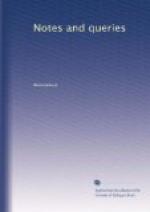S.W. SINGER.
* * * * *
ANNOTATED COPIES OF BISHOP ANDREWES’ WORKS.
Acting on a suggestion given in previous number, I beg to state that I shall be much obliged by the use of any annotated copies of the following works of Bp. Andrewes, which I am engaged in taking through the press:—Tortura Torti; Responsio ad Apolog. Cordius Bellarmini; Opuscula Posthuma; Two Answers to Cardinal Perron, &c.; Preces Privitae.
JAMES BLISS.
Ogburne St. Andrew, near Marlborough.
* * * * *
Minor Queries.
Robert Innes, a Grub Street Poet.—Is there anything known respecting a strange “madcap,” one Robert Innes, who, according to a printed broadside now before me, was a pauper in St. Peter’s Hospital, 1787? He was in the habit of penning doggrel ballads and hawking them about for sale. Some of them have a degree of humour, and are, to a certain extent, valuable at the present time for their notices of passing events. In one of these now rare effusions, he styles himself “R. Innes, O.P.,” and in explanation gives the following lines:—
“Some put unto their name A.M.,
And others put a D. and D.,
If ’tis no harm to mimick them,
I adds unto my name O.P.
“Master of Arts, sure I am not,
No Doctor, no Divine I be
But OAKUM PICKING is my lot,
Of the same clay are we all
three.”
The “works” of this “rogue and vagabond,” now in my possession, were given me by the late Mr. Catnach of Seven Dials.
EDWARD F. RIMBAULT.
The Sicilian Vespers.—In what English work can a full and correct narrative of this event be found?
C.H. COOPER.
Cambridge, July 29. 1850.
One Bell.—Can any of your readers favour me with a reference to some authority for the following, which may be found in Southey’s Book of the Church (vol. ii. p. 121.)?
“Somerset pretended
that one bell in a steeple was sufficient
for summoning the people to
prayer; and the country was thus in
danger of losing its best
music.”
What follows is so beautiful and appropriate, that I may perhaps be excused for lengthening my quotation:
“—a music, hallowed by all circumstances, which, according equally with social exultation and with solitary pensiveness, though it falls upon many an unheeding ear, never fails to find some hearts which it exhilarates, and some which it softens.”
It is a curious fact, that in many towers there may be often found a solitary black-letter Bell (if I may so call it), evidently of ante-Reformation date, making one of the peal.
H.T.E.




